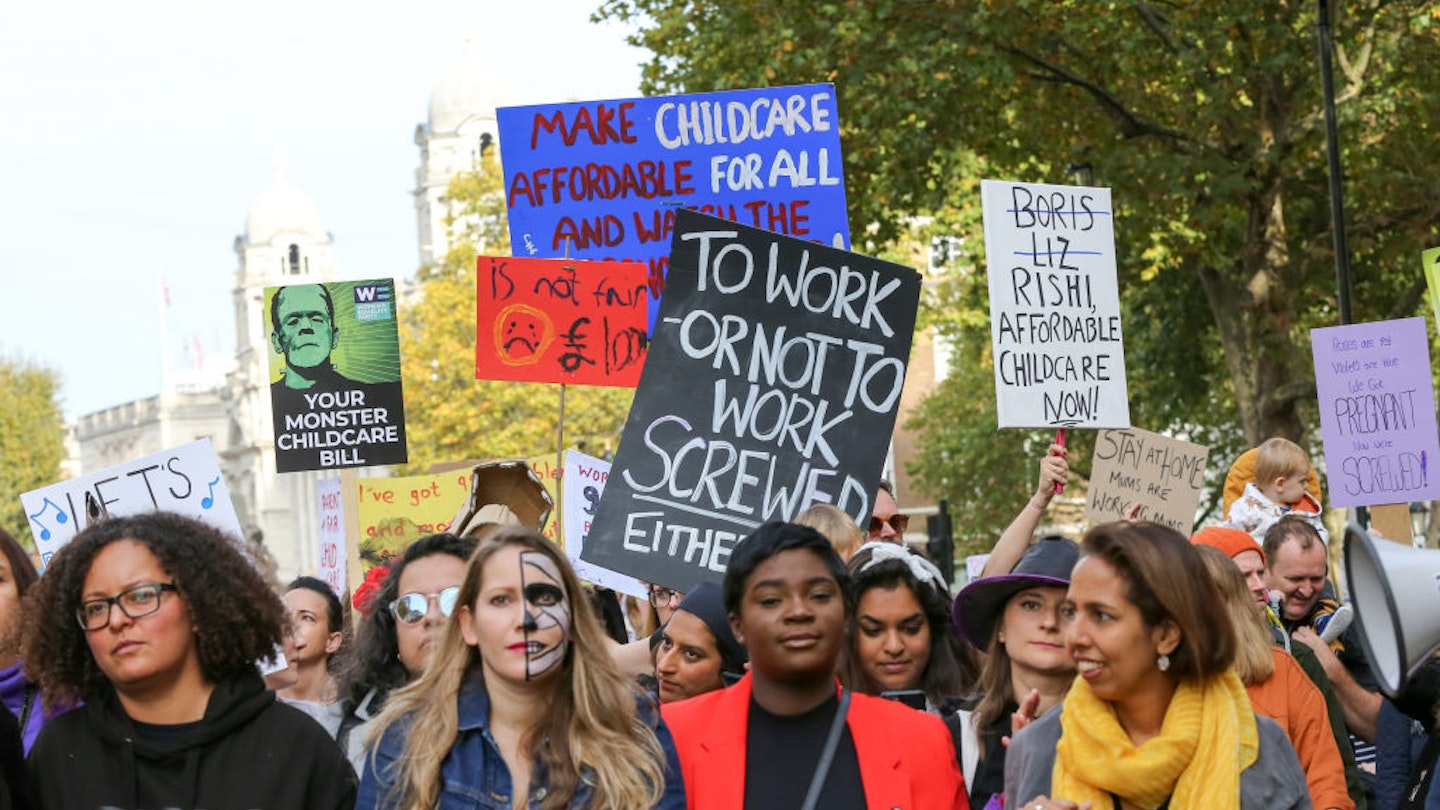When I told my employer I was pregnant, the following day my contract was ended. I was left unemployed with bills to pay at four months pregnant, I felt stressed, vulnerable, and alone. In the end, with support from family and friends, I managed to find my feet. But thousands of women are not as lucky. I was shocked to learn that 54,000 women a year lose their job simply for getting pregnant. After my experiences I started the organisationPregnant Then Screwed to raise awareness and, more importantly, to provide a voice for those who have suffered discrimination around their pregnancy.
In 2017, we held our first March of the Mummies, a family-friendly protest, which generated masses of press and public attention. The next day we were raised as a direct question to Theresa May at Prime Minister’s Questions. This level of attention and support is vital and would not have been possible if we hadn’t been able to take to the streets and make clear our demands.
Five years on, some things have changed but the need for us to protest for our rights is even more essential. Following the COVID-19 pandemic, the cost-of-living crisis and the near collapse of the childcare sector, mothers, parents, and families I talk to every day are completely deflated and feel abandoned by this Government.
Today, we’ve got a gender pay gap – recent research found that by the time a woman’s first child is 12 years old her hourly pay rate is 33% behind a man’s – women terminating pregnancies, and thousands more desperately wanting children but who can’t afford to take the risk. Women are falling out of the workforce in their masses and children are being pushed into poverty.
The March of the Mummies was born out of the need to raise awareness of the issues facing women and families across the country. Our protest last weekend in London was attended by over 15,000 people which included high-profile speakers and MPs Stella Creasy and Munira Wilson. Large swathes of the public don’t understand the specific challenges parents face and neither do they care. Protest gives us the chance to change their mind, to show the country that this affects everyone, and to make our voices heard to those in power. Tens of thousands of women and families have taken to the streets over political inaction on issues of unaffordable childcare and a lack of flexible working for parents. These are things all of us agree should be changed, but unless we make our voices heard, they won’t become reality.
Protest is such an important way for us to bring about change and awareness to ending discrimination in the workplace and to protect the rights of mothers, parents, and families more broadly. It shows the Government that we are organised, that we are angry, and that we will not stand for this. It signals to those in power that if they want to be re-elected then they better listen to us and act on these issues. Women’s economic empowerment hinges on a system that works for us, and the Government needs to start taking this, and us, seriously.
But now, through a new law being rushed through Parliament, the Government wants to make it harder for us to demand meaningful change and action.
The Public Order Bill, which passed its third reading this week before MPs and will soon be debated in the House of Lords, will make it harder for us all to stand up for the causes we believe in. We know that the measures in the Public Order Bill will disproportionately affect certain communities, including women, people of colour, and marginalised communities already at the sharp edge of discrimination.
In the Bill there are a raft of new measures including protest banning orders which can ban people for attending protests – to be given one of these orders, you don’t even need to have been convicted of a crime, but only to have gone to two protests in the last five years. The Bill also expands stop and search powers in the protest context, which means that people could be subject to police intimidation simply for having banners or fliers in their possession. Based on what we know about the discriminatory use of stop and search, this will have the greatest impact on communities of colour. Locking on, a tactic synonymous with the Suffragettes and women’s rights movements, will also be criminalised. Not only does the Public Order Bill risk criminalising thousands of people, it will also deter people from taking to the streets and speaking up.
For us, the Bill could deter mothers and families from taking part in future protests, for fear of being arrested, fined, or even imprisoned. Protest belongs to all of us. It’s a right that is behind so many of the freedoms we enjoy today – whether it’s the right to vote or the right to abortion access. Protest is not something that the State should be able to supress at will. It is an important tool for women to demand change, protection, and meaningful action. We have seen it first-hand all over the country with our marches that have opened up new and much-needed conversations. Instead of weakening our freedom of expression, the Government should be safeguarding our protest rights.
